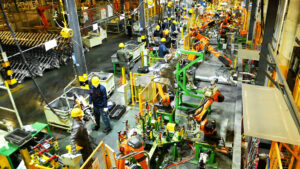The Auto Industry’s Response to Tariff Changes: What You Need to Know
The automotive sector is witnessing a significant turning point as the Trump administration contemplates potential exemptions to tariffs on auto parts imported from China. As reported by CNBC and other financial news outlets, these discussions could spell relief for manufacturers who have been grappling with rising costs and shifting regulations.
Recent Developments
On March 1, 2025, amidst ongoing concerns about international trade dynamics, President Trump suggested that exemptions might be on the table for automakers facing the imposition of 25% tariffs on auto parts. This would be separate from existing tariffs on imported vehicles, which are also set at 25%. These discussions arise in light of a broader strategy aimed at addressing issues such as fentanyl production and the need for domestic manufacturing.
The potential tariff exemptions have sparked a modest rise in the stock prices of major automakers and their suppliers, indicating market optimism. However, industry experts remain cautious, pointing to the impending deadline of May 3 for the auto parts tariffs as a critical date to watch.
The Concerns of the Automotive Industry
Not just manufacturers, but the entirety of the automotive supply chain is holding its breath. Six top automotive policy groups in the U.S. have come together—uncharacteristically united—to lobby for tariff relief. Their joint letter to the administration highlights the tangible worries posed by these new levies, which they argue could jeopardize U.S. production capabilities.
As Mary Barra, CEO of General Motors, emphasized during a recent summit, clarity and consistency in regulations are essential for automotive companies to thrive. She stated, "To make those investments and to be good stewards of our owner’s capital, I need to understand what the policy is." This clarity is critical for companies planning future investments and production strategies.
The Bigger Picture: Automakers’ Long-Term Strategies
Understanding the current landscape of trade tariffs raises questions about broader strategic shifts in the automotive industry. The partial exemptions could provide temporary relief; however, long-term success hinges on fundamental changes in domestic manufacturing and supply chain management.
-
Supply Chain Resilience: Automakers must prioritize establishing resilient supply chains to mitigate the impact of future tariffs. Considering local sourcing and building partnerships with domestic suppliers would be critical.
-
Investment in Technology: Companies that invest in automation and technology stand to benefit in the face of rising labor and material costs. By improving efficiencies, they can offset some of the financial burdens imposed by tariffs.
- Customer Engagement: Understanding consumer preferences for locally manufactured vehicles can help companies adapt their marketing strategies. Engaging consumers in sustainability conversations could further bolster brand loyalty and market positioning.
Conclusion
As the automotive sector navigates this intricate web of tariffs and trade policy, companies must remain agile and informed. The potential exemptions from tariffs, should they come to fruition, may offer a lifeline, but a proactive approach is necessary for sustainable growth. Extreme Investor Network will continue to monitor these developments closely, providing our readers with timely insights and analysis.
Stay tuned for more updates, and consider how these changes might affect your investment strategies in the automotive market. With the right information at hand, you can make informed decisions to navigate this evolving landscape.

